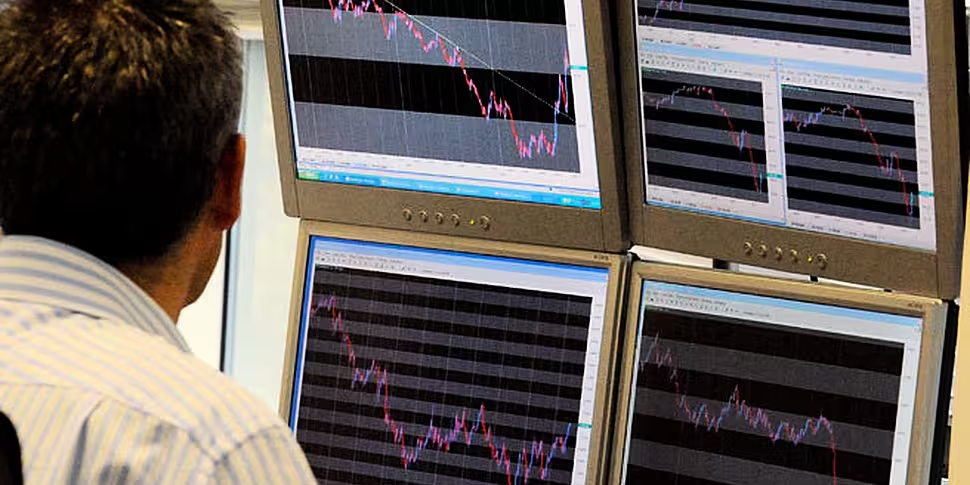The FTSE 100 in London is on course for one of its worst ever one-day falls, as world stock markets continue to take fright over the state of China's economy.
The sharp sell-offs, which started last week, were sparked by fresh evidence that the world's second-largest economy was losing more momentum than had been expected.
The Shanghai Composite tumbled 8.5% on Monday, having lost more than 10% already this month, leaving China's top index back at the level it started the year.
The fall was exacerbated, analysts said, by a lack of further stimulus from China's central bank which many had expected over the weekend to help support the flagging economy.
Europe followed Asia's lead.
The French CAC was almost 7% down and the DAX in Frankfurt was more than 5% lower by afternoon trading while the FTSE had shed more than 400 points to stand at 5768, equating to a loss of more than stg£107bn (€144bn) amid intense volatility.
While in Dublin, the ISEQ Index is down over 6% - its deepest fall of the year to date.
US markets followed their biggest one day drop in four years on Friday by opening more than 4% down, with the S&P 500 almost 5% down.
The tech-heavy Nasdaq lost almost 8%.
Market analysts added that automatic electronic trades were contributing to the heavy falls as many traders continued to enjoy summer holidays.
Takako Masai, the head of research at Shinsei Bank in Tokyo, said: "Markets are panicking. Things are starting look like the Asian financial crisis in the late 1990s.
"Speculators are selling assets that seem the most vulnerable".
China, the Yuan & commodity prices
Qi Yifeng, analyst at consultancy CEBM, said: "The market is in a downtrend. There's no good news, stocks are still expensive, and there's no fresh money coming in".
China's slowing economy and the depreciation of the Yuan as well as plunging commodity prices and fears over the timing of the next US interest rate hike have all contributed to the sell-off.
The worries have seen the FTSE 100 officially enter "correction" territory - more than 10% down from its all-time high of 7,104 in April.
It lost 5.5% - or £93bn (€126bn) - of its value last week alone while Monday's performance meant it was on track to achieve its tenth consecutive day of losses.
The index is vulnerable to problems in China because it is laden with commodities firms which have all been hit by price weaknesses.
Brent Crude oil is currently at six-and-a-half year lows amid poor demand and high production.
The People's Bank of China is under pressure to announce a new round of quantitative easing to boost money supply in an economy suffering weaker demand across all sectors.
The Chinese authorities have intervened numerous times to try and arrest the share sell-off - the latest measure allowing the state pension fund to invest up to 30% of its assets in Chinese stocks.
Since its peak on June 12th, the Shanghai market has lost around US$5.5tn of value. To put this into perspective, total UK GDP output for 2014 was stg£1.84tn.
While China has taken the spotlight, analysts have pointed to other fundamental factors at play in the share slide.
"On the surface it would be easy to point the finger at slowing China growth, falling oil prices and emerging market currency wars as the reason why global equity markets have fallen sharply through the summer," wrote Sean Darby, chief global equity strategist at Jeffries.
"However, a mix of disinflation and deflation forces, a tightening in global monetary conditions and deteriorating profits in emerging markets are much greater factors".
The oil price weakness is being particularly felt in Russia, where the rouble has hit a seven-month low against the dollar. Russia's failure to diversify its economy has left it vulnerable to oil price weakness.
It combined with the effects of western sanctions earlier this year to push the country into recession.









